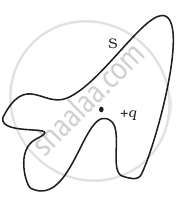Advertisements
Advertisements
प्रश्न
State Gauss’s law for magnetism. Explain its significance.
उत्तर
Gauss's law of magnetism states that net magnetic flux through a closed surface (Gaussian surface) is zero. Mathematically
`oint vecB.dvecs = 0`
Gauss’s Law for magnetism tells us that magnetic monopoles do not exist
APPEARS IN
संबंधित प्रश्न
A thin conducting spherical shell of radius R has charge Q spread uniformly over its surface. Using Gauss’s law, derive an expression for an electric field at a point outside the shell.
Draw a graph of electric field E(r) with distance r from the centre of the shell for 0 ≤ r ≤ ∞.
Answer the following question.
State Gauss's law on electrostatics and drive expression for the electric field due to a long straight thin uniformly charged wire (linear charge density λ) at a point lying at a distance r from the wire.
Gaussian surface cannot pass through discrete charge because ____________.
Which of the following statements is not true about Gauss’s law?
The Electric flux through the surface
 (i) |
 (ii) |
 (iii) |
 (iv) |
Five charges q1, q2, q3, q4, and q5 are fixed at their positions as shown in figure. S is a Gaussian surface. The Gauss’s law is given by `oint_s E.ds = q/ε_0`
Which of the following statements is correct?
If `oint_s` E.dS = 0 over a surface, then ______.
- the electric field inside the surface and on it is zero.
- the electric field inside the surface is necessarily uniform.
- the number of flux lines entering the surface must be equal to the number of flux lines leaving it.
- all charges must necessarily be outside the surface.
An arbitrary surface encloses a dipole. What is the electric flux through this surface?
If the total charge enclosed by a surface is zero, does it imply that the elecric field everywhere on the surface is zero? Conversely, if the electric field everywhere on a surface is zero, does it imply that net charge inside is zero.
